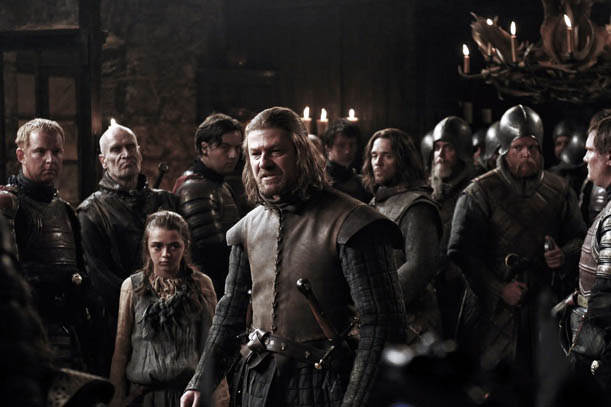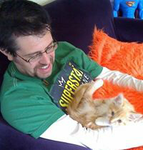PURE GOLDER The Beautiful Game
None
SFX online editor Dave Golder has a new best show (but can’t help blathering on about Doctor Who anyway)

Tempting as it is to devote another Pure Golder to Doctor Who I’m actually getting tired of reading, “It’s better than it’s ever been!” versus “My Auntie Mabel/dog/Weight Watchers support group doesn’t watch it any more!” arguments on the ’net. Besides which, I feel a bit of a hypocrite. I was one of the first to moan that the show was getting too complex for mainstream audiences (way back in my review for “The Impossible Astronaut”), before later realising that it wasn’t too confusing for me, so why should I worry about what other people think? Sure, I still have nitpicks, but I have nitpicks with any era of Who . And I’d rather have Moffat Who than John Nathan-Turner Who any day.
So instead: Game Of Thrones . Best TV Show Ever. (Be warned, I’m prone to bouts of hyperbole when I’ve found a new show I love.) Seriously, though, few new shows have grabbed me and dragged me through a first series the way Thrones has. I was ensnared within the first few minutes and it hasn’t let me go since.
I haven’t read the books. I’m not going to now. Well, not until the series is over (and I mean series , not season). I don’t want to have the story ruined for me, to be honest. I want to see it unfurl week by week, year by year without knowing when what’s going to happen. Plus, those books are big, and I’ve got too much TV to watch.
I honestly believe it’s the best looking TV series I’ve ever seen, with some stunning production design, lighting and camerawork. The characters are vivid, complex and exquisitely acted. It has a brilliantly evocative and constantly evolving opening title sequence. The battls are brutrally realistic and bloody. And, like its HBO stable mate True Blood … no, I wasn’t going to mention the amount of sex, though that is a valid comparison. Rather, I’m impressed by its uncompromising love affair with long, talky scenes. In a TV era in which visual storytelling seems to equate to a montage of subliminal images burning your retinas, Game Of Thrones has the balls to have four, five, six minute scenes of people just yabbering. Okay, they might be gutting a deer or practising their fencing while they’re doing it, but this isn’t show scared of overloading its audience with information.
And you know what? All this marathon politicking is downright riveting. Hell, it didn’t even matter that I couldn’t remember 75% of the characters’ names for the first eight episodes (not helped by the fact that most of the men in the House Of Stark look like they’ve been cloned). The characters and the dialogue they were spewing were so powerful they could have been named Pugh, Pugh, Barney McGrew, Cuthbert, Dibble and Grub for all I care.
(I’m getting better – I swear I could tell the difference between Rob Stark and Theon Greyjoy last episode.)
Get sneak previews, exclusive competitions and details of special events each month!
The show also has a refreshing lack of reliance on The Twist (presumably because of its source material). I’m not saying there are no twists, but it’s not a slave to The Twist in the way some US shows are. The plot is propelled by the characters not random events or revelations. Plot twists have to be used sparingly and organically in character-led drama otherwise they can end up looking like handy get-out clauses or contrived nonsense.
Thinking about this I recalled a conversation with a UK scriptwriter recently who had seen his baby reinvented for US TV a few years back. He was joking about how the US writers flet they had to introduce a Twist because they didn’t “get” the end of his show. His show had a “soft”, emotional, somewhat ambiguous final episode. The Americans had to finish things off by explaining everything in a way that left the audience with their jaws on the floor. The result was, frankly, ludicrous.
You only have to watch the US version of Being Human to see this in action again. When I watched the finale episode of their version’s first season, I initially thought it was quite clever how they introduced a twist on the UK version. Instead of George/Josh turning werewolf and then killing Herrick/Bishop, they made it look like that was going to happen, before suddenly changing everything and having a big showdown between Aidan and Bishop.
Well, that was cool if you’d seen the UK version and were wrongfooted. But what if you hadn’t? You really were getting the raw end of the deal, because the way things panned out were slave to the Twist, and the end result was nowhere near as dramatically satisfying as in the UK version.
Then you get shows like The Vampire Diaries or Lost which have so many twists you eventually suffer from twist fatigue and actively start trying to spot them before they happen.
You could argue that Doctor Who is currently going down this route. But Who has rarely been a show about character-driven storytelling. Plot twists have always been a part of its culture within individual stories; Moffat is simply extrapolating them on a grander scale through arc plots. He’d better be careful, though. An over-reliance on The Twist could backfire if audiences become so used to them they lose their potency.
But when Game Of Thrones twists, it twists skilfully. I was suckered by the end of episode seven (I won’t reveal it here in case it’s still unwatched on your Sky box) but it was nevertheless a logical turn of events based on what we knew about certain characters already. If Varis had suddenly whipped out a wand, Joffrey had exploded or Cersai had turned round and snogged Ned, I don’t think I’d have been quite so happy.
You get the idea. I love Game Of Thrones. It’s my Best Show Ever. Until the next one comes along. Or I catch Matt Smith in “The Doctor’s Wife” again. Or it goes rubbish. Fickle? Me?

Dave is a TV and film journalist who specializes in the science fiction and fantasy genres. He's written books about film posters and post-apocalypses, alongside writing for SFX Magazine for many years.


